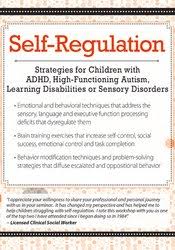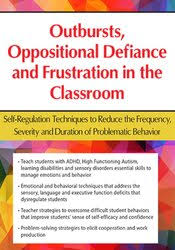🎁 Exclusive Discount Just for You!
Today only: Get 30% OFF this course. Use code MYDEAL30 at checkout. Don’t miss out!
This recording will assist you in making better interventions with the challenging child – the one who won’t sit still; doesn’t follow directions; often throws tantrums; or has difficulty waiting for It is their turn.
Laura Ehlert – Self-Regulation Strategies for Children with ADHD

Treatment Approaches using Processing Perspectives
- Self-improvement-Our own paradigm shifts can lead to regulation of children
- Ping + Ping + Ping = Frustration and dysregulation
- De-escalation strategies and precursers to problem-Solving
- Mindful and behavioral interventions for dysregulation triggers
Sensory deficiencies
- Integration, meaning, and perception
- Experience your own dsyregulation to sensory challenges
- Reduce sensory triggers
- Strategies to de-sensitize and reset the brain “panic switch”
- Reduce sensory overload by managing the environment
Language/Learning Deficits
- Integrate language processing into your understanding of behavior
- Response = Meaning = Reality = Perception = Meaning
- Your emotional response to language problems
- Recognize, validate, & Problem Solve-solve common language deficit triggers
- Social Pragmatics insight into and behavior
Executive Functioning Deficits
- Processing inconsistencies have an impact on day-to-day functioning
- See how we can set up our children to fail, even though we don’t realize it
- Problem-Strategies to improve organization, working memory, and meta-cognitive deficits
- Environments that reduce fidgeting, inattention, and restlessness and promote positive social interaction-Emotional regulation
- Executive skills shortages can cause roadblocks
Perspective-Taken and Meaning
- The “Set-up”: Child’s expectation + delayed development = failure
- Set appropriate expectations: The strengths and weaknesses of developmental models
- Strategies for Triggers
- Nurtured Heart Approach: Reinforcing desirable behavior
Behavioral Strategies
- Create realistic expectations through better understanding of the child’s process
- Skills coaching and behavior modification: Resetting and options to improve your self-Regulation
- Regulations in the environment
- Encourage children to be better-Regulation
- Cognitive restructuring to reduce tantrums and emotional dysregulation
Problem-Problem Solving Strategies
- Reduce stressors
- Improve child’s acceptance and personal responsibility for Behaviour
- Realistic expectations are important
- Flexibility in learning/teaching
- To self-empower, use language-Regulate
Neuro-Biological Considerations
- Diet/food
- Supplements/vitamins
- Sensitivities/toxins
- Exercise and movement to regulate the brain
Would you like to be contacted? Laura Ehlert – Self-Regulation Strategies for Children with ADHD ?
Description:
This recording will assist you in making better interventions with the challenging child – the one who won’t sit still; doesn’t follow directions; often throws tantrums; or has difficulty waiting for It is their turn. They might “hit first and ask questions later”. They are impulsive and can’t express what they want or what frustrates them. We know this child is intelligent, caring and kind, but their behavior doesn’t reflect these positive qualities. These are the children that frustrate and confuse parents as well as their teachers and peers. They are often unable or unwilling to fulfill basic expectations. with Both at home and with your peers.
Through discussion and hands-Through experience, you’ll discover that language, executive function and sensory processing deficiencies can lead to misperceptions concerning the causes of emotional or behavioral dysregulation in these kids. You will learn strategies for Change your perception, create expectations and create environments that help children succeed at school, home and in school. with peers!
- Recognize signs that dysregulation is caused by underlying processing deficiencies
- Strategies To improve your self-Control, social success and emotional control are key to completing tasks.
- Strategies To reduce the frequency and length of tantrums, emotional outbursts, and their duration
- Problem-Strategies for creating positive expectations and positive coping strategies, including positive structure and positive expectations.-Regulation
- Interventions to reduce stress and brain training exercises to increase self-confidence-Regulation
Course Features
- Lectures 0
- Quizzes 0
- Duration Lifetime access
- Skill level All levels
- Language English
- Students 0
- Assessments Yes


